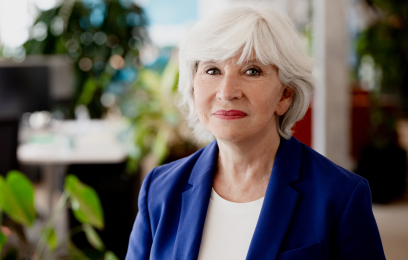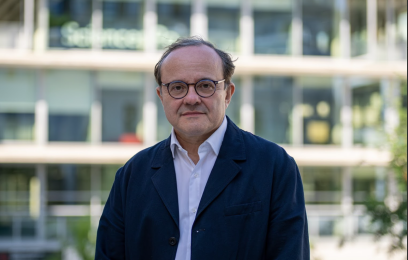CIVICA – The European University of Social Sciences is one of the sixteen European university alliances to receive continued support from the 2022-2027 Erasmus+ programme, as the European Commission announced this week.
After a three-year pilot phase, this achievement sets the stage to establish CIVICA as an integrated deep and fully-fledged European university alliance in the social sciences, now bringing together ten world-renowned higher education institutions across Europe. During this new phase, CIVICA aims to develop a joint vision for 2030 with respect to priorities on education, research, innovation and service to society.
With a total budget of 272 million euros, the European Commission launched the 2022 Erasmus+ European Universities call to facilitate the full roll-out of the European Universities initiative. The CIVICA alliance outlined an ambitious set of actions for the future in a strategic proposal submitted last March. The new Erasmus+ programme will provide each selected alliance with up to 14.4 million euros to foster the institutional transformation of the European Higher Education and Research Area.
“We are all thrilled to hear about this positive outcome as the European Commission has decided to continue supporting CIVICA’s development” said Mathias Vicherat, President of Sciences Po and CIVICA Coordinator. “The renewed Erasmus+ support will accelerate CIVICA’s ambition to assume civic responsibility for current and future European generations, to strengthen the role of Europe in the world, and raise the profile of European social sciences in education and research.”
A coherent and diverse expanded alliance
CIVICA will foster transnational cooperation of world-renowned universities working together for the benefit of students, teachers, researchers and society, as it welcomes two new full partners. IE University (Spain) and the SGH Warsaw School of Economics (Poland) will formally join the alliance in October 2022 as the new phase begins.
“The CIVICA alliance fully supports the policy objectives set for the roll-out phase for the initiative in bringing new partners from across Europe while maintaining a clear and strong coherence among the members around a shared vision and common values” said Kate Vivian, alliance coordinator and Acting Vice-President of International Affairs at Sciences Po.
“In the first pilot years of CIVICA, our alliance has proved exceptionally resilient and able to successfully develop innovative programmes in education and research despite an extraordinary set of circumstances” Vivian stressed. “Based on the first activities implemented and the impactful results achieved, the alliance has confirmed its high potential and is eager to further strengthen its ambitions with the addition of two new partners.”
The expanded alliance will connect more than 72,000 undergraduate and graduate students to a community of 13,000 faculty members and about 7,000 administrative staff from all over the world. “We strongly believe in the fruitful and mutually beneficial cooperation that this project will bring. Grateful to the European Commission for the trust and the support received, SGH Warsaw School of Economics is looking ahead to developing the European University of the future alongside its CIVICA partners” reported SGH Rector, prof. Piotr Wachowiak. “In the past 115 years we have been shaping leaders for the future, and we are certain that SGH’s involvement in the activity of CIVICA will contribute to this mission better than anything else”, he added. For Manuel Muñiz, Provost of IE University and Dean of IE School of Global and Public Affairs “CIVICA will enhance the work that our ten institutions are doing individually on different fronts, enabling us to fulfil our mission in a more impactful way. IE University is thrilled to join the CIVICA alliance. We very much look forward to working with our colleagues on the advancement of European higher education and, above all, addressing together some of the major challenges of our time.”
Building the European University of Social Sciences
CIVICA‘s primary goal is to imbue meaning into its vision of shaping the European University of the future by 2030. To achieve the goal, the partner institutions are committed to consolidate and further expand the alliance with a physical and digital inter-university campus that links teaching and learning, research and innovation, and civil society.
“As one of the founding members of the alliance, we are proud to be part of CIVICA and to contribute to its continued success“ affirmed the new President of the Hertie School in Berlin, Cornelia Woll. “The role of universities is key to navigate the enormous processes of social, economic, and technological change occurring in our society. If we are to discuss and find solutions to the most pressing policy and social issues, we must lock arms across borders and work together on research, teaching, and outreach activities.”
By echoing European policy priorities for the future of higher education, the alliance will continue to establish deeper and sustainable forms of transnational institutional cooperation among its members. Beyond facilitating lifelong learning and the exchange of talent, the ten members aim to develop a diverse and inclusive CIVICA community, while extending the alliance’s global outreach to establish itself as a leading actor in the social sciences.
With the new activities starting in autumn 2022, members of the alliance will give thousands of students and (post)doctoral researchers the chance to benefit from enhanced mobility, new and expanded joint educational offers, and Europe-wide opportunities for civic engagement and extracurricular activities. By autumn 2026, the alliance aims to increase student mobility by 25%, while providing more than 2,000 educational offerings for bachelor and master's students and more than 400 activities for early career researchers over the duration of the project.
Aurélien Krejbich, Executive Director of CIVICA, shares the enthusiasm of all alliance members in embarking onto this new phase: “We are looking forward to kicking off the second round of our ambitious project. This new phase will see the anchoring of the alliance at the institutional level with one priority: make CIVICA a reality for the highest possible number of students, researchers and faculty. We believe that this new chapter will be pivotal in the building of the European University of Social Sciences. We congratulate our fellow alliances who received a positive outcome from the European Commission and we look forward to working together to bring higher education in Europe to the next level.”
In line with a recent CIVICA’s statement, the future work package includes actions to support scholars and students who are at risk due to the war in Ukraine. “In such difficult times, we have to strengthen our cooperation and highlight how all our partners work together as an open academic community who actively contributes to long-lasting peaceful solutions” added Krejbich “CIVICA offers a source of stability and an environment in which the values of autonomy and academic freedom can be defended, particularly in the face of evolving and often challenging European political contexts”.
END
For more information, please contact:
Alessia Manco
CIVICA, Communications Manager
a.manco(at)hertie-school.org
Press contacts
Bocconi University: Tomaso Eridani: tomaso.eridani(at)unibocconi.it / +39-335-6352819
Central European University: Ildiko Rull: rulli(at)ceu.edu
European University Institute: Jessica Carter: jessica.carter(at)eui.eu / +39 377 3905 933
Hertie School: Alina Zurmühlen: pressoffice@hertie-school.org / +49 160 911 669 83
IE University: Rosa Aranda Barrio: Rosa.Aranda(at)ie.edu
National University of Political Studies and Public Administration: Cătălin Mosoia catalin.mosoia(at)snspa.ro / +40723540213 | Anca Goga: anca.goga(at)snspa.ro / +40726.317.063
Sciences Po: Romain Becker: media(at)sciencespo.fr / +33 (0)1 45 49 50 79
SGH Warsaw School of Economics: Maria Karaś: mkaras1(at)sgh.waw.pl | Mariusz Sielski: rzecznik(at)sgh.waw.pl / +48(22)2649947
Stockholm School of Economics: Hanna Flodmark: ylva.mossing(at)hhs.se/+46 730 97 26 16
London School of Economics and Political Science: Associated partner: Danny O’Connor: oconnord(at)lse.ac.uk / +44 (0)207 955 7417
Notes to the editors:
CIVICA brings together ten leading European higher education institutions in the social sciences, humanities, business management and public policy, with a total of 72,000 students and 13,000 faculty members. Together, they build on an ever-stronger combination of teaching, research and innovation to mobilise and share knowledge as a public good and to facilitate civic responsibility in Europe and beyond.
CIVICA’s members are: Bocconi University (Italy), Central European University (Austria), European University Institute (Intergovernmental), Hertie School (Germany), IE University (Spain), National University of Political Studies and Public Administration (Romania), Sciences Po (France), SGH Warsaw School of Economics (Poland), Stockholm School of Economics (Sweden) and The London School of Economics and Political Sciences (United Kingdom).
• www.civica.eu and @CIVICA_EU
• www.unibocconi.eu
• www.ceu.edu
• www.eui.eu
• www.hertie-school.org
• www.ie.edu
• www.snspa.ro
• www.sciencespo.fr
• www.sgh.waw.pl
• www.hhs.se
• www.lse.ac.uk

01.07.2025
SCIENCES PO CRÉE LA PARIS CLIMATE SCHOOL,
LUIS VASSY NOMME LAURENCE TUBIANA COMME DOYENNE
Paris, le 01 juillet 2025 - Projet fort du directeur de Sciences Po Luis Vassy, la Paris Climate School est la première école européenne en sciences humaines et sociales visant à former des décideurs pour mener la transformation écologique, gérer les risques climatiques et renforcer la résilience de nos sociétés.
La Paris Climate School est la huitième école diplômante à Sciences Po. Elle accueillera dès la rentrée 2026 une cohorte d'une centaine d'étudiants dans un master, d'une durée de 2 ans et dispensé en anglais, intitulé « Ecological transition, risks and governance ».
Elle sera dirigée par Laurence Tubiana, dont l'expérience unique, à l'interface de la science, de la diplomatie climatique et de l'action publique, incarne l'ambition de cette école : former une nouvelle génération de décideurs capables de répondre à l'urgence écologique.
Diplomate et économiste, Laurence Tubiana est présidente de la Fondation européenne pour le climat (ECF) depuis 2017 et envoyée spéciale pour l'Europe pour la COP30. De janvier à juin 2025, elle a co-présidé le comité de préfiguration de la Paris Climate School avec Sophie Dubuisson-Quellier, directrice de recherche au CNRS et directrice du Centre de sociologie des organisations (CSO) de Sciences Po. Elle a été ambassadrice chargée des négociations lors de la COP21 et a co-présidé la Convention citoyenne pour le climat en 2020.
Sophie Dubuisson-Quellier dirigera le Comité Scientifique, composé des membres de la faculté permanente et des enseignants qui interviendront dans l'école.
Luis Vassy, directeur de Sciences Po : “Face à la gravité de la crise écologique et à son caractère existentiel, nous avons la responsabilité d'agir. Avec le lancement de la Paris Climate School, toute première école du climat en Europe, nous allons former à Sciences Po une nouvelle génération de décideurs outillés intellectuellement pour penser les bouleversements en cours et conduire les transformations systémiques. Cette école formera des professionnels du privé comme du public pour financer la transition, la planifier, et gérer les risques climatiques. Je me réjouis que Laurence Tubiana ait accepté de devenir la doyenne de la Paris Climate School. Son expérience unique, à l'interface de l'économie, de la diplomatie climatique et de l'action publique, incarne l'ambition de cette école. C'est une grande fierté pour Sciences Po.”
Laurence Tubiana, doyenne de la Paris Climate School : “Je suis très fière et très enthousiaste de devenir la doyenne de la Paris Climate School. Cette création intervient à un moment décisif pour le futur de notre planète et de nos sociétés. Face à l'urgence écologique, il est indispensable de former des jeunes capables de penser et d'agir autrement. Sur le climat, Sciences Po peut devenir un acteur de rang mondial, en alliant excellence académique, interdisciplinarité et engagement.”
Lire plus


